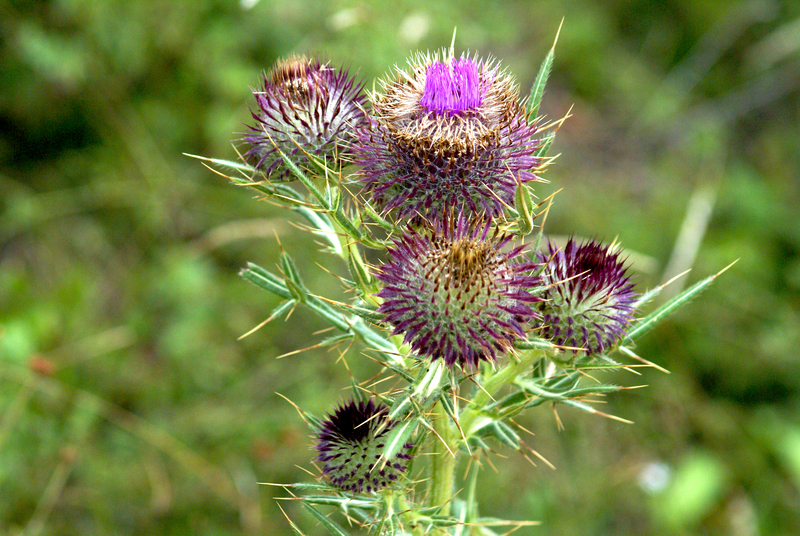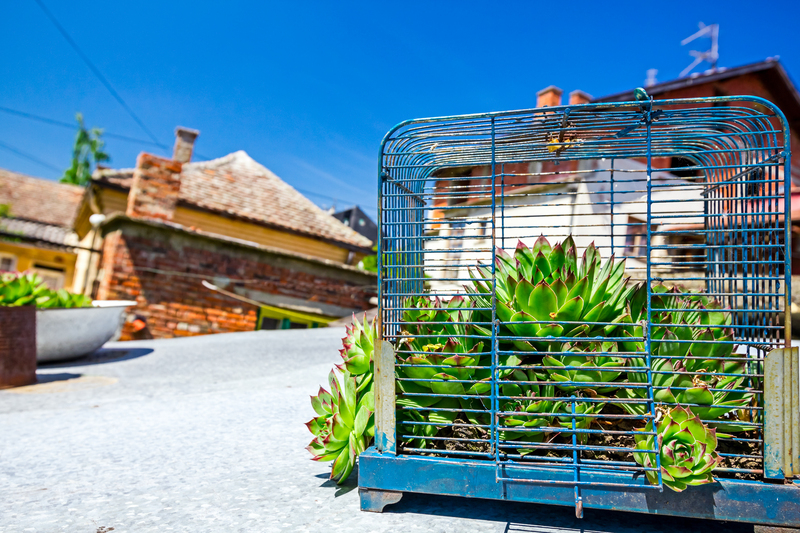Garden Your Way to a Healthier Planet and Reduce Climate Change
Posted on 16/09/2025
Garden Your Way to a Healthier Planet and Reduce Climate Change
Are you seeking impactful, simple ways to protect the environment and fight global warming? Gardening to reduce climate change can make a bigger difference than you might think! Whether you have a sprawling backyard or a cozy balcony, your green space can become a powerful tool in the battle for a healthier earth. In this comprehensive article, we'll reveal how gardening benefits the environment, practical steps you can take, and the science behind how your personal garden can help the planet and mitigate climate change.
How Gardening Impacts Climate Change
Did you know that by simply tending to your plants, you can actively combat the threats of climate change? At first glance, gardening may seem purely recreational. However, when done mindfully, ecological gardening actually reduces your carbon footprint and plays a critical role in environmental stewardship. Here's how:
- Carbon capture: Plants absorb carbon dioxide, the main greenhouse gas driving climate change, and release life-giving oxygen. Even a small patch of green can make a meaningful impact.
- Biodiversity boost: A diverse garden supports pollinators, birds, and essential microorganisms, strengthening local ecosystems that capture more carbon and resist environmental swings.
- Soil health: Healthy soil stores more carbon, prevents runoff, and creates resilient landscapes that absorb heavy rains and sequester harmful gases.
- Reduction in food miles: Growing your own food means less transport, packaging, and refrigeration - all of which reduce greenhouse gas emissions.
- Chemical reduction: Organic gardening avoids harmful fertilizers and pesticides that add to emission levels, protect waterways, and safeguard wildlife.

The Science Behind Gardening for a Greener Planet
When you embark on the journey to garden for environmental health, you're participating in a fascinating planetary system. Here's a closer, science-based look at how gardening impacts the climate:
Plants as Natural Carbon Sinks
Through photosynthesis, plants absorb carbon dioxide from the atmosphere and convert it into energy for growth. Larger plants and trees are particularly effective "carbon sinks." Global experts agree: If everyone integrated more greenery into their surroundings, even via balcony or rooftop gardening, the cumulative effect would be substantial.
Soil's Role in Reducing Greenhouse Gases
Healthy, compost-enriched soil acts as a sponge for carbon dioxide. Through a process known as carbon sequestration, microorganisms in vibrant soils lock away carbon, preventing it from returning to the atmosphere. By gardening organically and maintaining soil health, you directly contribute to this global process.
Resilience to Extreme Weather Patterns
- Rains: Strong root systems help prevent erosion during storms.
- Heat waves: Leafy plants provide cooling shade, lower local temperatures, and decrease artificial energy needs.
- Floods and droughts: Deep-rooted plants and healthy soils store water, buffering against both extremes.
These mechanisms demonstrate how people can create climate-resilient habitats simply by gardening thoughtfully!
Get Started: Sustainable Gardening Best Practices
Ready to transform your yard, balcony, or community lot into a climate-smart garden? These actionable tips will help you maximize your garden's positive impact on the planet, no matter your experience level.
Choose Native and Climate-Appropriate Plants
Opt for plants naturally adapted to your region. These varieties demand less water, fertilizer, and pesticide, while providing habitat for local wildlife. Research shows native plants play a vital role in supporting biodiversity and healthy soil.
- Visit local nurseries for native plant options.
- Check with conservation organizations or botanical gardens for advice.
- Start with low-maintenance varieties to build confidence and success.
Compost and Mulch: Double Benefits
Composting kitchen scraps and yard waste keeps organic matter out of landfills (where it generates methane, a potent greenhouse gas) and enriches your soil. Mulching further reduces evaporation and prevents weeds, meaning fewer interventions and less water waste.
- Create a simple compost bin or pile in a shady spot.
- Use leaves, straw, or grass clippings as mulch.
Water Wisely
Climate-friendly gardening uses every drop of water efficiently. Install rain barrels to collect runoff, water early or late to reduce evaporation, and use drip irrigation instead of sprinklers. Choose drought-tolerant plants if you're in a dry region.
Grow Your Own Food to Reduce Food Miles
Every salad picked from your own plot eliminates the need for long-distance transportation, packaging, and refrigerated storage. Grow tomatoes, herbs, greens, and root veggies to enjoy fresh picks right outside your door - a delicious way to garden for climate action!
- Start simple: Lettuce, salad greens, and herbs can be grown in containers.
- Expand to beans, tomatoes, or root crops as you gain confidence.
- Share excess with neighbors or donate to community food programs.
Use Organic Methods and Avoid Chemicals
Synthetic fertilizers and pesticides are fossil-fuel derivatives and disrupt delicate soil webs. Instead, practice organic gardening using compost, crop rotation, and natural pest controls to enhance your garden's balance and minimize emissions.
Maximize Your Impact: Community and Urban Gardening
Think beyond your fence! Community gardening and urban green spaces are powerful levers in the fight against climate change:
- Community involvement: Shared spaces increase green cover, support biodiversity, and create micro-climates that lower urban temperatures.
- Rooftop & vertical gardens: In cities, these innovations capture carbon, cool buildings, and reduce stormwater runoff.
- Pollinator corridors: Community-driven pollinator pathways sustain bees, butterflies, and birds, which are crucial for regional food security and ecological stability.
If you don't have room for an at-home garden, join a local initiative or support efforts to create urban gardens and green roofs in your city. Many municipalities offer seed swaps, gardening classes, and grants for new green spaces--an opportunity to garden your way toward a climate solution on a greater scale.
Eco-Gardening Techniques for Every Gardener
No matter your space or level of expertise, you can adopt eco-friendly techniques that support a healthier environment and reduce your personal contribution to climate change.
- Plant a tree or shrub: Trees provide long-term carbon capture and valuable shade.
- Minimize lawn area: Replace turf with wildflowers, shrubs, or vegetable beds for a richer, more sustainable landscape.
- Embrace "no-dig" gardening: Reduce tilling, which releases stored carbon from the soil.
- Leave the leaves: Allowing autumn leaves to decompose naturally cycles nutrients back into the soil and promotes beneficial insects.
- Attract pollinators: Incorporate flowering plants that offer nectar and habitat for bees, butterflies, and other vital insects.
Benefits Beyond the Planet: Personal Wellness and Community Resilience
When you garden for the planet, you also nurture your own well-being and strengthen your community:
- Physical health: Gardening is excellent exercise and time spent outdoors reduces stress and supports mental health.
- Healthy eating: Homegrown produce is fresher, tastier, and often higher in nutrients than store-bought alternatives.
- Social connections: Gardening brings people together, encourages knowledge sharing, and builds local resilience.
- Financial savings: Growing your own food can lower your grocery bills and buffer your household from supply chain disruptions.
These personal rewards, when multiplied across communities, lead to a cultural shift where people come together to create climate solutions that benefit both themselves and the world around them.
Success Stories: Climate Change and Gardening in Action
Urban Farming Movement
Cities around the globe are transforming idle lots into productive urban farms. In cities like Detroit and Singapore, urban gardens have led to millions of pounds of fresh food grown locally every year, substantial carbon reductions, and vital wildlife corridors. These spaces also foster youth leadership and offer safe, green havens for communities.
Backyard Revival
Homeowners are increasingly ditching traditional lawns for pollinator-friendly meadows, food forests, or native plant beds. These transformations boost soil health, support wildlife, and contribute to city-wide efforts that lower average temperatures and improve air quality.

FAQ: Gardening for a Healthier Planet
Don't I need a big yard to have an impact?
Absolutely not! Gardening for climate resilience works at every scale. Window boxes, rooftop containers, and balcony herb gardens all contribute. The key is to grow mindfully, using soil-building techniques, compost, and plant choices that suit your local environment.
What should I avoid if I want to reduce my gardening carbon footprint?
Avoid synthetic fertilizers and pesticides, limit the purchase of non-native or high-maintenance plants, and minimize the use of gas-powered tools. Instead, go electric, hand-powered, or solar where possible.
How can I encourage my neighborhood or school to start climate-friendly gardening?
Share this article, organize a garden day, or collaborate with local schools or civic groups. Even small pollinator patches and raised beds can inspire neighbors to get onboard and multiply your impact!
Your Garden Makes a Difference
Whether you're planting your first herb pot or rewilding your entire yard, your actions matter. When you garden with climate change in mind, you repair the earth with every seed sown. Plant by plant, bed by bed, we can create greener cities, restore biodiversity, and protect future generations.
Ready to garden your way to a healthier planet? Join the movement and become part of the climate solution--right in your own backyard.
- Start small, dream big. Every plant counts!
- Share your knowledge and harvests with neighbors.
- Support local gardening organizations and green spaces.
Let your garden be a thriving testament to hope, health, and a stable climate. Together, we can all help reduce climate change, one garden at a time.
Latest Posts
Top Picks: Must-Have Gear for Garden Enthusiasts
Garden Your Way to a Healthier Planet and Reduce Climate Change
Unveiling the secrets of container gardening

